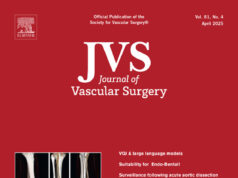The Society for Vascular Surgery (SVS) is calling for comments on the proposed SVS clinical practice guidelines for chronic mesenteric ischemia. Comments are sought—and should be submitted—by July 8
Development of the guidelines has been overseen by the SVS Document Oversight Committee (DOC).
The SVS says submitted comments will help provide the Society, committee and writing panel with valuable input in order to finalize this document. Email comments here along with your name, title, organization and medical specialty.
The writing committee consists of chairman Thomas S. Huber, MD, Martin Bjorck, MD, Ankur Chandra, MD, W. Darrin Clouse, MD, Michael C. Dalsing, MD, Gustavo S. Oderich, MD, and Matthew R. Smeds, MD.
“Following collection and incorporation of comments, the final document will be reviewed again by the DOC and the SVS Executive Board,” the SVS said in a communique. “Once the approval process is complete, the document will be submitted to the Journal of Vascular Surgery for publication. Once published it will also be available on the SVS website.”
Chronic mesenteric ischemia results from the inability to achieve adequate postprandial intestinal blood flow, usually from atherosclerotic occlusive disease at the origins of the mesenteric vessels, the writing panel notes in the guidelines.
“Patients typically present with postprandial pain, food fear and weight loss although they can present with acute mesenteric ischemia and bowel infarction,” they write by way of background. “The diagnosis requires the combination of the appropriate clinical symptoms and significant mesenteric artery occlusive disease although it is often delayed given the spectrum of gastrointestinal disorders associated with abdominal pain and weight loss.
“The treatment goals include relieving the presenting symptoms, preventing the progression to acute mesenteric ischemia and improving overall quality of life. These practice guidelines were developed to provide the best possible evidence for the diagnosis and treatment of patients with chronic mesenteric ischemia from atherosclerosis.”
They found that patients with symptoms consistent with chronic mesenteric ischemia should undergo an expedited workup—including a CT arteriogram—to exclude other potential causes.
“The diagnosis is supported by significant arterial occlusive disease in the mesenteric vessels, particularly the superior mesenteric artery,” the panel goes on. “Treatment requires revascularization with the primary target being the superior mesenteric artery. Endovascular revascularization with a balloon-expandable covered intraluminal stent is the recommended initial treatment with open repair reserved for select younger patients and those that are not endovascular candidates.
“Long-term follow up and surveillance are recommended after revascularization and for asymptomatic patients with severe mesenteric occlusive disease. Patients with recurrent symptoms after revascularization due to recurrent stenoses should be treated with an endovascular-first approach, similar to the de novo lesion.”
The full guidelines are located here.









